
We have joined the Federal Government’s 50 – 30 Challenge to demonstrate our commitment to diversity and inclusion.
The goal of the Challenge is to encourage organizations to reach 50% gender parity and 30% representation from under-represented groups, including racialized persons, those who identify as LGBTQ2, people living with disabilities, as well as First Nations, Inuit and Métis peoples, at the board and senior management levels.
Our Board of Directors has achieved this goal and our management team is very close. This undertaking is part of our Anti-Racism, Anti-Oppression Plan.
For more information on the challenge, visit: www.canada.ca/50-30-Challenge. We strongly encourage your organization to consider signing up.
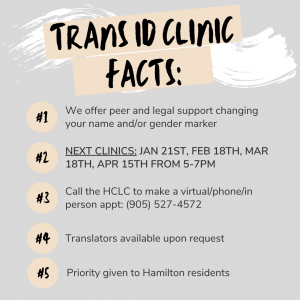
Wednesday, December 16, 2020
Dr. Elizabeth Richardson
Medical Officer of Health, City of Hamilton elizabeth.richardson@hamilton.ca
Dear Dr. Richardson,
The purpose of this letter is to draw your attention to your legal authority and responsibility to order the suspension or restriction of enforcement of residential eviction orders – a measure urgently needed to help reduce the spread of COVD-19 and the threat that it poses to health. As our city’s Medical Officer of Health, we demand that you act upon the overwhelming evidence that residential evictions exacerbate homelessness, overcrowding of shelters, circulation between households, and other phenomena that encourage the spread of this virus, as well as the human suffering and death that result from it.
The Superior Court of Justice had suspended residential eviction enforcement in Ontario from mid March until the end of July 2020, but has since concluded that it does not have jurisdiction to reconsider or reverse that decision. The Court has instead held that the question of whether to suspend evictions is a public policy decision for government to make.
Last week, the Ontario Legislative Assembly unanimously adopted a resolution calling for the suspension of residential eviction enforcement in this province until the end of the COVID-19 pandemic. The passage of that resolution came after similar calls by the City of Toronto, the Regional Municipality of Peel and the Toronto Board of Health seeking provincial action on this matter.
However, none of those resolutions are binding on government, and so enforcement of residential evictions continues as though there is no pandemic. In our view, as the government official tasked with preventing the spread of disease and protecting the health of the people of Hamilton, you have the power and responsibility to make the decision to suspend the enforcement of residential evictions during the COVID-19 pandemic. This decision is especially yours to make because it requires the application of public health evidence to temporarily restrict an activity likely to spread a communicable disease.
Section 22 of the (“HPPA”) gives you, as a medical officer of health, the power to make orders that “may require a person to take or to refrain from taking any action that is specified in the order in respect of a communicable disease.” Your order may be directed at one or more classes of persons (e.g., residential landlords seeking to enforce eviction orders, and Court Enforcement Officers or the “Sheriff”), and may be binding on other branches of government.
In September, the U.S. Centres for Disease Control and Prevention (CDC) declared
residential evictions of tenants “detrimental to public health control measures to slow the
spread” of COVID-19 and instituted a nation-wide partial moratorium. The CDC were acting on evidence that enforcement of residential eviction orders not only causes persons to circulate within outdoor encampments, shelter spaces, public transit, and acute health care settings – but even in the best-case scenario, such evictions cause entire households to move into other households, increasing contact between persons of varying ages, health conditions, and activity levels within the community.
As the weather turns colder and the second wave of COVID-19 continues, all of these ordinary consequences of residential eviction pose an added health risk not only to low- income and racialized communities most evicted, but to their families, friends, and ultimately the public at large. Tenants facing eviction may end up as patients in a hospital emergency room or long-term care facility; some of them already work as front- line staff in those facilities or in our factories, kitchens, grocery and hardware stores.
All our political leaders seem to agree that something should be done. The CDC took this action months ago. It is time for you to act.
Sincerely,
Hamilton Community Legal Clinic
CC: Hamilton Public Health (publichealth@hamilton.ca)
Ali Naraghi – Staff Lawyer
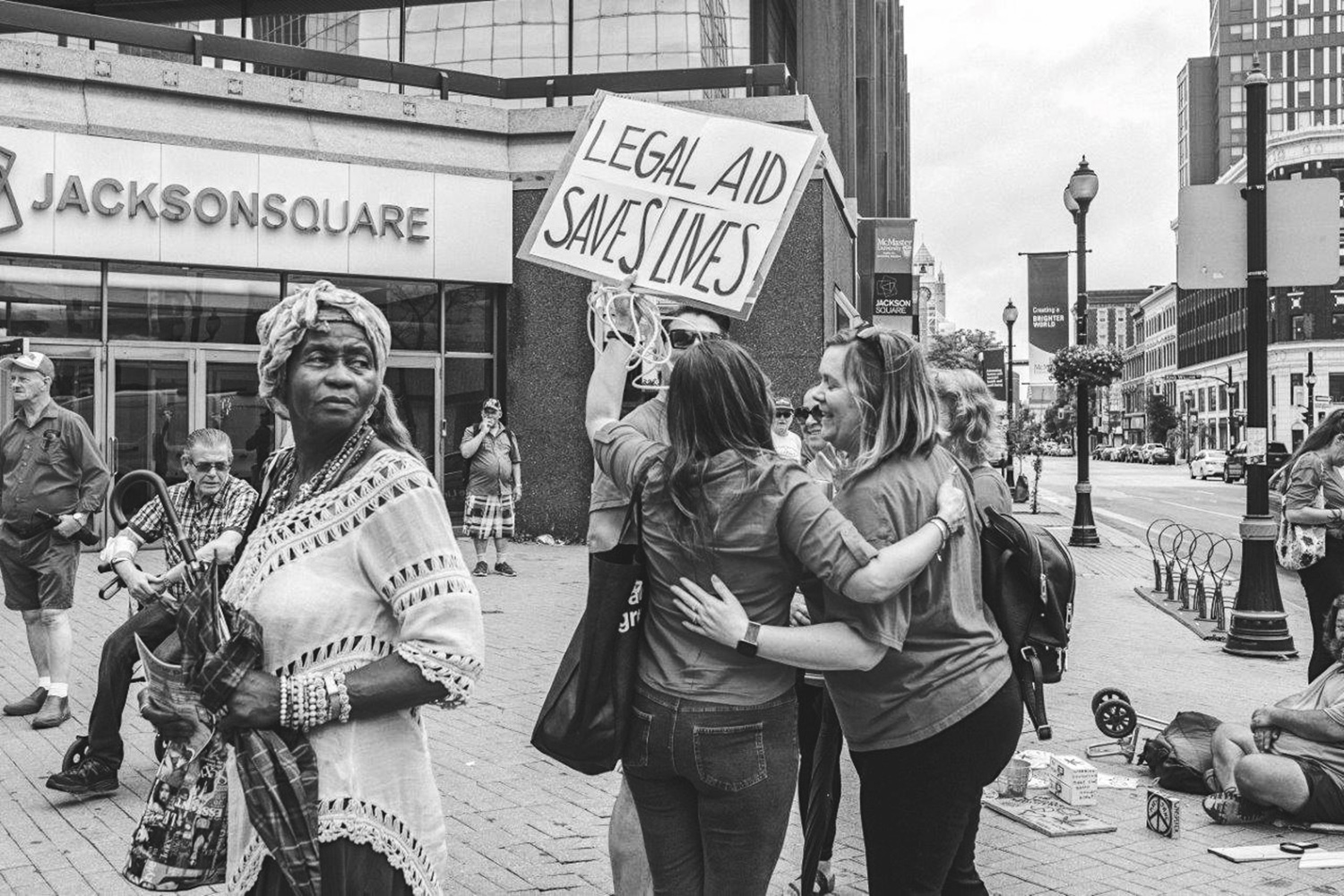
December 8, 2020
The Honourable Doug Downey Attorney General of Ontario McMurtry-Scott Building, 11th Floor 720 Bay St
Toronto, ON M7A 2S9
The Honourable Todd Smith
Minister of Children, Community & Social Services
7th Floor, 438 University Ave. Toronto, ON M5 G 2K8
Sent via email: Doug.downey@pc.ola.org, Todd.Smithco@pc.ola.org
Dear Attorney General Downey and Minister Smith,
RE: ALARMED FOR THE FUTURE OF THE SOCIAL BENEFITS TRIBUNAL AND APPEALS PROCESS
We are writing on behalf of the Steering Committee for Social Assistance, the community legal clinics’ working group made up of representatives from across the Province with the participation of specialty clinics including the Income Security Advocacy Centre (ISAC) and Community Legal Education Ontario (CLEO) as well as the Clinic Resource Office (CRO). The Steering Committee seeks opportunities to improve social assistance policies and procedures through ongoing communication with government, the community legal clinics, and other affected groups.
Governments, through the Ontario Disability Support Program and Ontario Works, have sought to support Ontarians with disabilities and others who would otherwise live in poverty. Understandably, the application and appeal process are constantly under scrutiny. However, we are concerned that the Social Benefits Tribunal is being severely curtailed, and we are alarmed by signals that it may be in the process of being eliminated.
Legal clinics are reporting that some of their clients will have to wait until 2022 to get their appeals heard. We believe that the delays are in part due to the shortage in the number of current adjudicators at the Tribunal. Having people who live in deep poverty wait for over a year to get benefits causes undue hardship, which is now felt even more given the Covid-19 Pandemic. We support a Social Benefits Tribunal that is resourced with an appropriate number of adjudicators, so that appeals can be heard in a timely way. We urge you to take action to address this important access to justice issue.
The right to an appeal process at the Tribunal is enshrined in legislation, and it is a vital one that needs to be preserved. Even in the best of application systems, it is only fair and reasonable to apply a check on the decision-making of Ministry staff. We call on the provincial government to publicly declare that it will preserve the important independent role of the Social Benefits Tribunal in ensuring that no one is wrongly denied the benefits they need for their survival.
Sincerely, Laura Hunter
Michael OIlier
Co-Chairs of the Steering Committee on Social Assistance
Cc. Sent via email to:
Gurratan Singh, Critic, Attorney General, New Democratic Party. GSingh-QP@ndp.on.ca Lisa Gretzky, Critic, Community and Social Services, New Democratic Party LGretzky- QP@ndp.on.ca Lucille Collard, Critic, Attorney General, Liberal Party. LCollard.mpp.co@liberal.ola.org Michael Coteau, Critic, Community and Social Services, Liberal Party.Mcoteau.mpp.co@liberal.ola.orgMike Schreiner, Leader, Green Party. Mschreiner-co@ola.org Sean Weir, Executive Chair, Tribunals Ontario. Sean.Weir@ontario.ca Stacey Ferguson, Associate Chair, SBT.Stacey.Ferguson@ontario.ca Sharon Buchanan, Counsel, Tribunals Ontario. Sharon.buchanan@ontario.ca
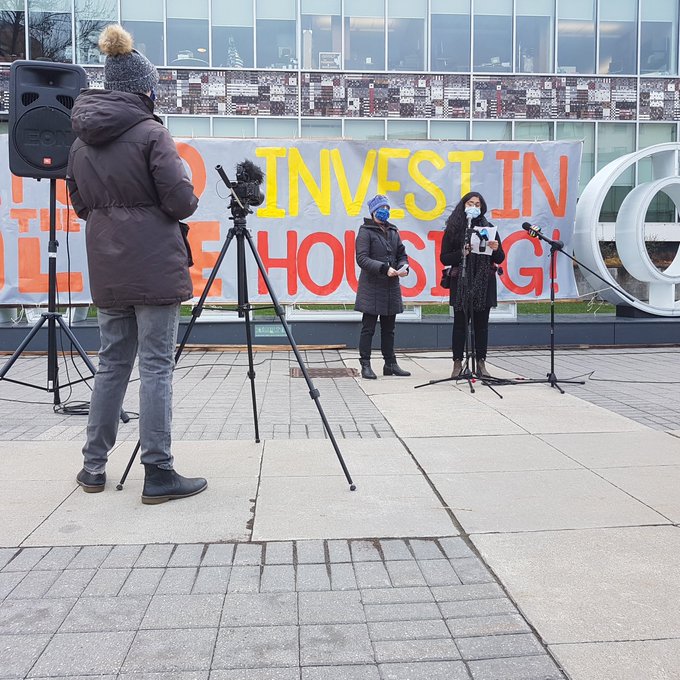
UPDATE: November 30, 2020
We are concerned about the inconsistency between the City of Hamilton’s earlier messaging and today’s actions with respect to the peaceful protest on the City Hall forecourt. On Friday a bylaw officer was recorded stating that protesters could remain and now several have been issued Trespass to Property orders. It is additionally disappointing that the City has elected to take these extreme measures without any meaningful dialogue with protesters about the policing and affordable housing issues raised
November 25, 2020
Hamilton is in the midst of a full blown housing crisis. It has been compounded by the pandemic that has exposed long-standing social inequities. Vulnerable and marginalized individuals and communities are bearing the brunt of rising rents, dwindling stock and low vacancy rates, as well as COVID-19.
Housing is a human right and it is the linchpin social determinant of health. There is an urgent need for the provision of affordable housing. In these desperate times, citizens of this community are taking extraordinary measures to bring attention to this emergency.
We stand in solidarity with the peaceful, impassioned protesters in the forecourt of City Hall. They deserve our respect and to be heard. We call for an immediate dialogue about a collaborative plan to address this crisis as a City and in conjunction with the provincial and federal governments.
We are concerned that an intentional protest not be mischaracterized as an encampment. The Canadian Charter of Rights and Freedoms encourages all of us to assemble and express our views. We are particularly alarmed that a protest organizer has been ticketed and faces a $10,000 fine for event participants breaching COVID-19 measures while exercising a constitutional right. At a time when a Toronto restaurant owner’s actions to flagrantly breach lockdown restrictions result in minimal, the crackdown on a young, Black woman speaks to an oppressive double standard that our democratic society cannot tolerate.
We urge caution and cool heads. We call upon institutional leaders to recognize and respect the protest for what it is and enter into immediate dialogue.
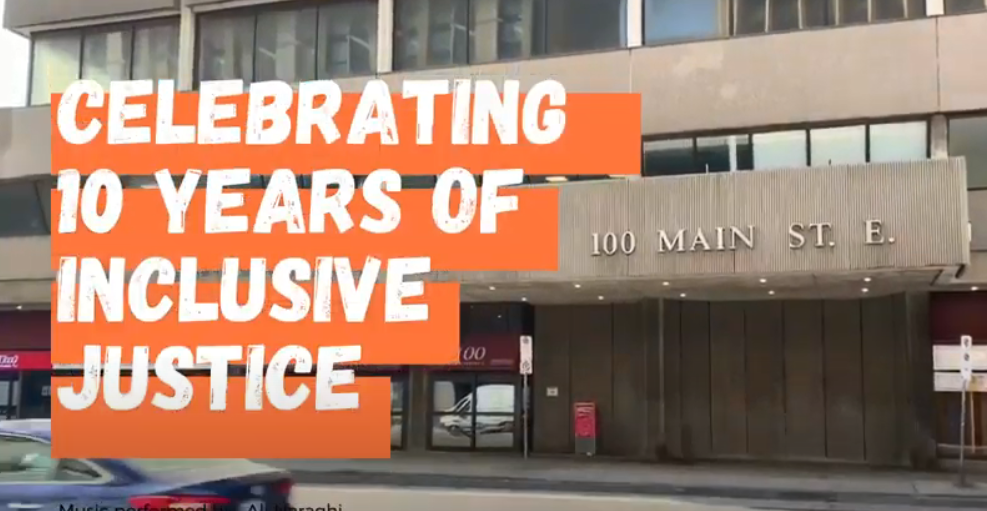
On April 1st, 2010, the Hamilton Community Legal Clinic first began its operations after amalgamating three longtime legal clinics. We are proud to say that it has been 10 years since we began serving Hamilton as one, unified clinic. Our services aim to reach populations that have been disproportionately ignored and mistreated by our legal system. Today, we are proud to say we have built relationships with many of these communities to deliver services and advocate for systemic change. We have done this by working within and with these communities. We achieve positive changes and strengthen our community by promoting inclusive justice for vulnerable Hamilton residents.
We had initially thought of holding a free community dinner to thank and honour our community and partners through music, dance and laughter and to celebrate 10 years of inclusive justice.
Although “celebrations” aren’t appropriate or indeed possible in these difficult times, we do wish to celebrate our commitment and actions to achieve inclusive justice. We also look forward to when we can celebrate together, by breaking bread and honouring each other and our stories and will do so as soon as it is safe to gather.
Take a look at our 10th Anniversary video!
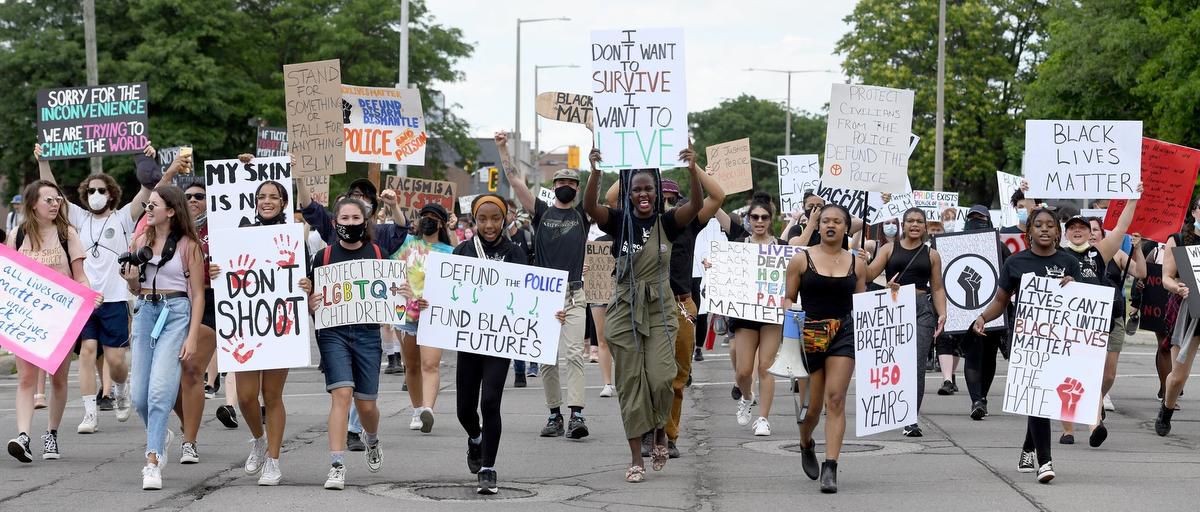
Transformation of the Criminal Justice System:
A Call for a Societal Anti-Racism Anti-Oppression Framework
A white police officer’s knee on the neck of an immobilized Black man is a powerful analogy for the State’s violent repression of some of its citizenry. Incidents of police violence caught on video are driving demands for transformative, societal change here in Hamilton, across Canada and around the world. We join that call as we share the pain and righteous rage communities are experiencing in response to this abuse. Canada was founded on racial injustice yet has a long history of denying that racism proliferates in this country. Finally, systemic racism has been acknowledged by government and institutional leaders and a broad coalition of people and organizations is demanding the dismantling of structural inequities. We join others in calling for the implementation of an anti-racism, anti-oppression framework as the foundation for this social change.
Community legal clinics have been working with low income individuals and communities in Hamilton for over forty years. It is our experience, and we know from evidence, that poverty marginalizes people in all aspects of their lives and is a key social determinant of health and inclusion. We also know that people experiencing poverty are disproportionately Indigenous, Black, racialized, female-identifying, people with disabilities including mental health, members of the 2S and LGBTQIAPGNC communities and newcomers.
As a mainstream, government-funded agency, we have been taking a critical look at how we contribute to the perpetuation of colonization and systemic racism and oppression. It is an uncomfortable and unsettling process, one that requires honesty, education, listening, self-reflection and empathy. It requires a deep understanding of the history and current reality of white supremacy and how privilege influences people’s outcomes positively and negatively. It is also inspiring and motivating. We have embarked on a journey to develop and implement a robust Anti-Racism, Anti-Oppression (ARAO) Plan. It is a framework for all decision-making, service delivery, community engagement, policy development and human resources, as well as all personal interactions.
This same ARAO lens must be the approach to transform the criminal justice system. It would influence every decision necessary to design laws, procedure, structures, institutions and processes, including governance, oversight and accountability measures. It would centre diverse people as the architects of change and amplify the voices of those who have been historically disempowered and silenced. It would recognize that the police are only one part of a larger state funded and operated system that must be wholly re-envisioned.
Hamilton Community Legal Clinic supports transformational change of the criminal justice system including investing in decriminalization, disarmament, demilitarization and alternatives to policing. We support the reallocation of resources to community-centred supports, including health, housing, education, youth, social development and programs that improve quality of life and community wellbeing.
We join the call for structural change, as opposed to incremental tweaks. We provide the following as examples of essential reforms. This list is not exhaustive, but illustrates a holistic, ARAO approach to meaningful, transformative change:
The time for change is now. And it must be transformative .